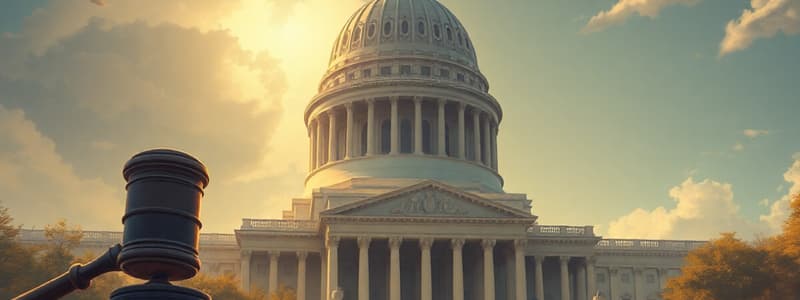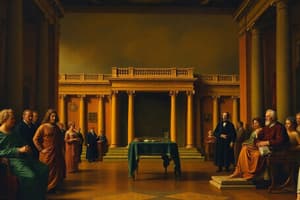Podcast
Questions and Answers
What does the Constitution serve as in the legal hierarchy?
What does the Constitution serve as in the legal hierarchy?
- A fundamental law with limited authority
- A guideline for moral and ethical behaviors
- An outdated historical document
- The supreme law that all other laws must adhere to (correct)
Which of the following is NOT defined by the Constitution?
Which of the following is NOT defined by the Constitution?
- Limits of governmental power
- Roles and responsibilities of public authorities
- Fundamental rights of individuals and groups
- Procedures for issuing currency (correct)
How does the Constitution contribute to national identity?
How does the Constitution contribute to national identity?
- By recognizing and protecting core values and language (correct)
- By establishing laws for trade and commerce
- By detailing the roles of government officials only
- By focusing solely on economic policies
Which aspect of social contract does the Constitution address?
Which aspect of social contract does the Constitution address?
What type of government structures does the Constitution outline?
What type of government structures does the Constitution outline?
What is the primary role of the Constitution regarding individual rights?
What is the primary role of the Constitution regarding individual rights?
Which of the following describes the relationship between the legislative, executive, and judiciary as outlined in the Constitution?
Which of the following describes the relationship between the legislative, executive, and judiciary as outlined in the Constitution?
What does the Constitution provide for societal needs?
What does the Constitution provide for societal needs?
Which of the following is NOT a role of the Constitution?
Which of the following is NOT a role of the Constitution?
What is a key characteristic of the Constitution's role in the government's operation?
What is a key characteristic of the Constitution's role in the government's operation?
What is one of the primary tasks of the legislative authority?
What is one of the primary tasks of the legislative authority?
Which of the following is NOT a task of the legislative branch?
Which of the following is NOT a task of the legislative branch?
How does the legislative authority assist the government?
How does the legislative authority assist the government?
Why is collaboration between the branches of government important?
Why is collaboration between the branches of government important?
What role does the legislative branch play in community affairs?
What role does the legislative branch play in community affairs?
What is the primary function of a parliament?
What is the primary function of a parliament?
Which of the following best describes the principle of separation of powers?
Which of the following best describes the principle of separation of powers?
What method do representatives use to join the parliament?
What method do representatives use to join the parliament?
Which of the following is NOT a component of the democratic system?
Which of the following is NOT a component of the democratic system?
Which authority operates independently under the principle of separation of powers?
Which authority operates independently under the principle of separation of powers?
What is the primary function of the executive authority?
What is the primary function of the executive authority?
Which of the following is NOT a task of the executive authority?
Which of the following is NOT a task of the executive authority?
Who are included as members of the executive authority?
Who are included as members of the executive authority?
What is a key responsibility of the executive authority regarding citizens?
What is a key responsibility of the executive authority regarding citizens?
In which system is the executive authority commonly found?
In which system is the executive authority commonly found?
What does the executive authority do for foreign diplomacy?
What does the executive authority do for foreign diplomacy?
What is the primary aim of judicial authority?
What is the primary aim of judicial authority?
What is the role of the Court of First Instance?
What is the role of the Court of First Instance?
What distinguishes the Court of Appeals from the Court of First Instance?
What distinguishes the Court of Appeals from the Court of First Instance?
What is a function of courts as symbols of justice?
What is a function of courts as symbols of justice?
Which statement correctly describes the function of judicial authority in dispute resolution?
Which statement correctly describes the function of judicial authority in dispute resolution?
What can happen during a review by the Court of Appeals?
What can happen during a review by the Court of Appeals?
What is a characteristic of the Court of Cassation?
What is a characteristic of the Court of Cassation?
What is the primary function of the Court of Cassation?
What is the primary function of the Court of Cassation?
Which role is typically assigned to the Constitutional Court?
Which role is typically assigned to the Constitutional Court?
What distinguishes the judgments of the Constitutional Court?
What distinguishes the judgments of the Constitutional Court?
Which of the following statements about the Court of Cassation is true?
Which of the following statements about the Court of Cassation is true?
How does the Constitutional Court differ from the Court of Cassation?
How does the Constitutional Court differ from the Court of Cassation?
What is the primary function of the Court of Cassation?
What is the primary function of the Court of Cassation?
Which of the following best describes the role of the Constitutional Court?
Which of the following best describes the role of the Constitutional Court?
What is a key characteristic of the judgments made by the Constitutional Court?
What is a key characteristic of the judgments made by the Constitutional Court?
How does the Court of Cassation differ from the Constitutional Court?
How does the Court of Cassation differ from the Constitutional Court?
Which of the following statements is true regarding the powers of the Constitutional Court?
Which of the following statements is true regarding the powers of the Constitutional Court?
Flashcards are hidden until you start studying
Study Notes
The Constitution
- The Constitution is the foundational law of a state.
- It defines the structure of the state and government, including its form (unitary or federal) and system (monarchy or republic).
- It outlines the roles and responsibilities of the government branches: legislative, executive, and judicial.
- It details the interactions and limitations of these authorities.
- It establishes and protects fundamental rights and responsibilities for individuals and groups.
Importance of the Constitution
- Apex of the Legal Pyramid: Serves as the ultimate legal authority, guiding all other laws and legislation.
- Defines State and Government: Specifies the nature of the state and its governmental structure with clear roles for different branches.
- National Identity: Creates a sense of national identity, shaping the nation's core values, language, and spiritual ideals.
- Individual Rights: Safeguards individual rights and liberties, including political, religious, and civil freedoms.
- Social Contract / Social Justice: Reflects a social contract, balancing individual needs with the needs of society, encompassing economic and social wellbeing.
Legislative Authority
- The legislative branch creates and changes laws.
- The executive branch carries out the laws.
- The judicial branch makes sure laws are applied fairly.
- All branches should work together and watch over each other to protect people's rights.
Legislative Branch's Key Tasks
- Monitoring the executive branch: This means checking how the executive is using its power and making sure it follows the laws.
- Making laws: The legislative branch creates new laws and changes existing ones.
Other Tasks of the Legislative Branch
- Represent individuals and groups: The legislative branch speaks for the people in decision-making.
- Guiding and assisting the government: The legislative branch helps the government do what is best for the people.
- Increasing community awareness: The legislative branch helps people understand how the government works and what policies are being made.
- Financial control: The legislative branch approves the state's budget and controls its spending.
Parliamentary Representatives
- Parliamentary representatives are individuals elected democratically.
- Their election process is based on freedom of political participation and a multi-party system.
- Parliament operates as a representative body, responsible for all legislative matters.
- The principle of separation of powers governs the parliament's activities.
- The separation of powers principle distributes government functions among the legislative, executive, and judicial authorities.
- Each authority functions independently.
Executive Authority
- The executive authority implements and enforces laws made by the legislative council.
- The executive authority is composed of the prime minister, ministers, chancellor or president (titles vary by country).
- This system is common in parliamentary systems.
- The executive authority is the government, responsible for managing affairs, maintaining security, and monitoring citizens' conditions.
- The executive authority provides protection and security for citizens.
Tasks of the Executive Authority
- Foreign Diplomacy: Establishing political and economic relations with other countries and signing agreements.
- Military Defense: Maintaining security and protecting borders by preparing armies against external aggression.
- Maintaining Internal Order: Ensuring justice and equality among citizens, while protecting civil liberties and freedoms guaranteed by the constitution.
Judicial Authority
- The purpose of judicial authority is to establish justice without discrimination, preserve individual property, resolve disputes, and sentence appropriately.
- Courts are a symbol of justice and represent a structure of different levels in a legal system
- The levels of courts include the Court of First Instance, Court of Appeals, and the Court of Cassation (or Supreme Court).
- The initial stage of litigation is the Court of First Instance, where individuals seek rights or services and must follow national laws and regulations
- The Court of Appeals reviews sentences from the Court of First Instance and determines if the initial sentence should be overturned or amended.
- If the initial sentence is valid, it cannot be overturned or increased in the Court of Appeals.
- If the initial sentence might be false or contain errors, it can be overturned or increased in the Court of Appeals.
Court of Cassation
- The Court of Cassation serves as the highest court in the country.
- Its main purpose is to review lower court decisions for legal errors.
- The Court of Cassation does not adjudicate initial cases or resolve disputes.
Constitutional Court
- The Constitutional Court holds the highest judicial authority within the state.
- The Court's powers are outlined by the country's constitution and can vary between states.
- The Court ensures all laws and decisions are consistent with the constitution.
- The Court interprets the constitution.
- The Court has jurisdiction over disputes involving senior officials.
- The Court's decisions are final and binding.
Court of Cassation
- The Court of Cassation is the highest court in the judicial system.
- It primarily reviews lower court decisions to ensure the correct application of the law.
- The Court of Cassation does not handle initial cases or resolve disputes.
Constitutional Court
- The Constitutional Court is the supreme judicial authority in the country.
- Its powers are outlined in the country's constitution.
- The Constitutional Court ensures that all laws and decisions align with the constitution.
- It interprets the constitution and handles legal disputes involving senior officials.
- The Constitutional Court's judgments are final and legally binding.
Studying That Suits You
Use AI to generate personalized quizzes and flashcards to suit your learning preferences.




